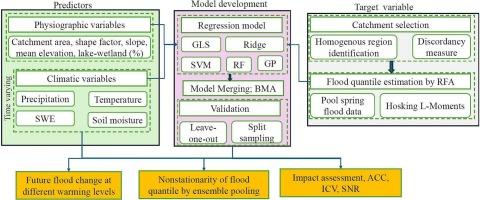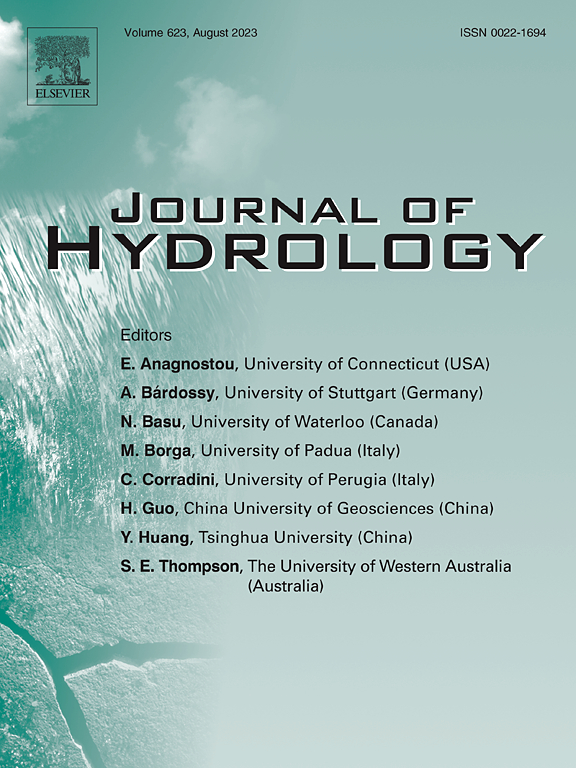基于机器学习的气候适应性基础设施区域洪水频率框架
IF 6.3
1区 地球科学
Q1 ENGINEERING, CIVIL
引用次数: 0
摘要
传统的设计洪水估算方法假设固定条件并依赖历史气候数据,可能会低估或高估洪水风险。本研究提出了一个基于回归的区域洪水频率分析(RFFA)框架来评估不同变暖情景下春季洪水分位数的预估变化。该方法利用贝叶斯平均模型(BMA)整合了五种不同的回归模型,建立了洪水分位数与流域生理气候变量之间的函数关系。关注安大略省普遍的春季洪水,BMA-RFFA框架在洪水分位数上表现出令人满意的预测性能。利用CanRCM4大集合模拟的气候数据预估未来洪水分位数,在单一模式和情景下捕获集合扩展。结果表明,不同变暖情景下,洪水中位数变化在- 13% ~ + 20%之间分布均匀,南部和西部地区增加,中部地区减少,空间变异性显著。季节性储水量和降雨强度等气候变量被确定为未来洪水行为的关键预测因子。利用集合池方法推导了1950 - 2100年10年间的连续设计洪水变化,捕捉了气候集合变率驱动的洪水分位数的时间演变。研究还分析了人为气候变化(ACC)和内部气候变率(ICV)的贡献,结果表明,在大部分流域,人为气候变化(ICV)占主导地位,而内部气候变率在西部地区的影响更大。总体而言,拟议的框架提供了对未来洪水分位数的增强估计,并在预测的气候变率下对其变化行为进行了可靠的评估,支持改进洪水风险评估和基础设施恢复能力。本文章由计算机程序翻译,如有差异,请以英文原文为准。

Machine learning-based regional flood frequency framework for climate resilient infrastructure
Traditional design flood estimation approaches assume stationary conditions and rely on historical climate data, potentially under- or over-estimating flood risks. This study proposes a regression-based Regional Flood Frequency Analysis (RFFA) framework to assess projected changes in spring flood quantiles under various warming scenarios. The methodology integrates five distinct regression models using Bayesian Model Averaging (BMA) to establish functional relationships between flood quantiles and catchment physio-climatic variables. Focusing on Ontario’s prevalent spring floods, the BMA-RFFA framework demonstrates satisfactory predictive performance across flood quantiles. Future flood quantiles are projected using climatic data from CanRCM4 large ensemble simulations, capturing ensemble spread under a single model and scenario. Results indicate a nearly even distribution of median flood quantile changes from −13 % to +20 % under different warming scenarios, with increases in southern and western regions and decreases in the central region, highlighting spatial variability. Climatic variables such as seasonal water storage and rainfall intensity are identified as key predictors of future flood behavior. Continuous design flood changes over 10-year intervals from 1950 to 2100 were derived using an ensemble pooling approach, capturing the temporal evolution of flood quantiles driven by climate ensemble variability. The study also examined the contributions of Anthropogenic Climate Change (ACC) and Internal Climate Variability (ICV), revealing ICV as dominant in most catchments, while ACC shows stronger influence in western regions. Overall, the proposed framework provides enhanced estimation of future flood quantiles and a robust assessment of their changing behavior under projected climate variability, supporting improved flood risk assessment and infrastructure resilience.
求助全文
通过发布文献求助,成功后即可免费获取论文全文。
去求助
来源期刊

Journal of Hydrology
地学-地球科学综合
CiteScore
11.00
自引率
12.50%
发文量
1309
审稿时长
7.5 months
期刊介绍:
The Journal of Hydrology publishes original research papers and comprehensive reviews in all the subfields of the hydrological sciences including water based management and policy issues that impact on economics and society. These comprise, but are not limited to the physical, chemical, biogeochemical, stochastic and systems aspects of surface and groundwater hydrology, hydrometeorology and hydrogeology. Relevant topics incorporating the insights and methodologies of disciplines such as climatology, water resource systems, hydraulics, agrohydrology, geomorphology, soil science, instrumentation and remote sensing, civil and environmental engineering are included. Social science perspectives on hydrological problems such as resource and ecological economics, environmental sociology, psychology and behavioural science, management and policy analysis are also invited. Multi-and interdisciplinary analyses of hydrological problems are within scope. The science published in the Journal of Hydrology is relevant to catchment scales rather than exclusively to a local scale or site.
 求助内容:
求助内容: 应助结果提醒方式:
应助结果提醒方式:


